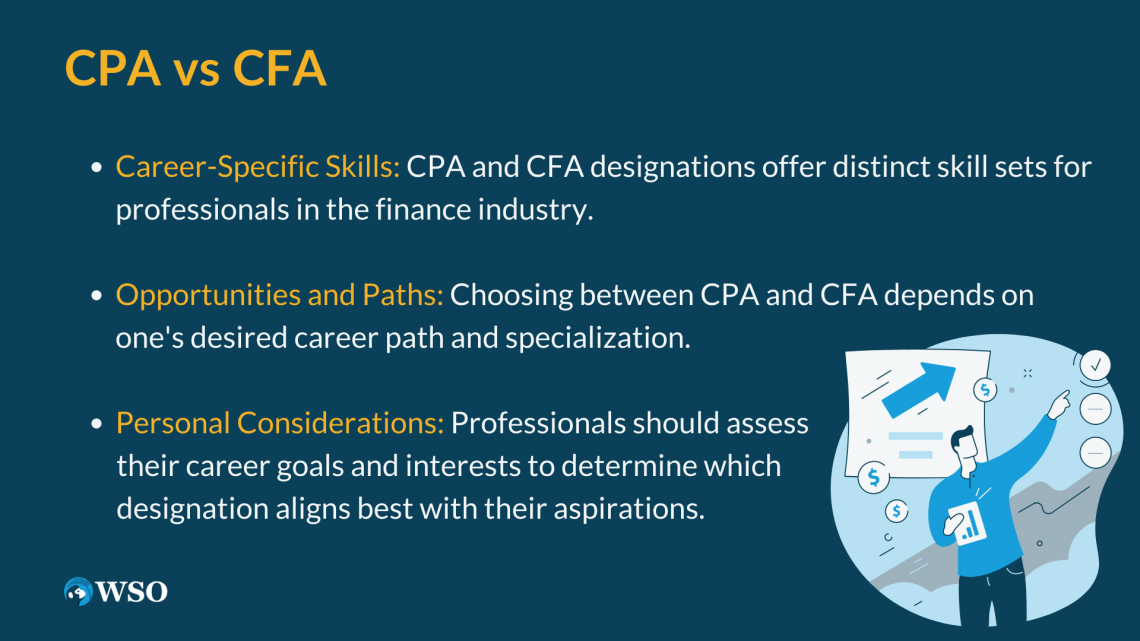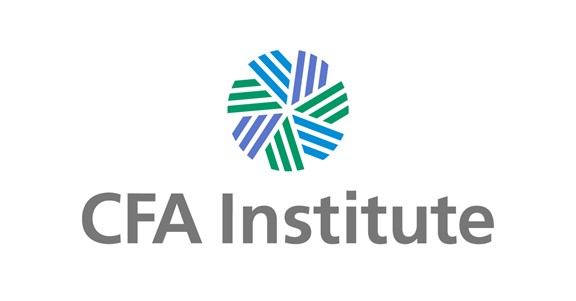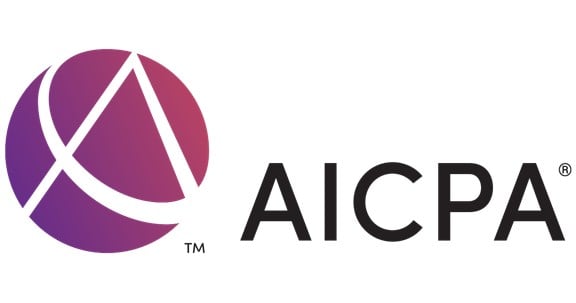CPA vs CFA®
CPA vs CFA, which one is better for me?
What Is CPA Vs. CFA?
A common question frequently asked among professionals in the finance industry is whether they should pursue a CPA or a CFA designation and which one will open up more opportunities. Both courses provide a unique skill set and cater to different professionals. Hence, the answer to this question depends on the career path that one plans to take.

The CPA designation focuses on accounting, auditing, and taxation and is very helpful for those looking for a career that involves auditing, advisory, consulting, tax planning, and more.
On the other hand, a CFA designation focuses on skills required for portfolio management and security analysis.
Hence, CFA charterholders usually work in big banks or asset management firms such as JP Morgan Chase and Blackstone, whereas CPAs tend to work in a much broader range of roles in various corporations and tax and audit firms.
Another option to consider is getting neither, especially when both designations are not necessary to achieve your goals. For instance, if you are trying to break into investment banking, it could be more beneficial to spend time networking and preparing for interviews instead of studying for the exams for either license.
To aid you in your decision, this article will explore characteristics of both designations, including:
- The similarities and differences
- What the exams are like
- Where to study for both designations
- Possible career opportunities
What is the CFA credential?
The Chartered Financial Analyst (CFA) designation is the most widely recognized and respected professional credential in global investment management. To earn this designation, you must pass three levels of exams, each focused on a different area of expertise within the industry and satisfy the professional experience requirements.

The CFA exams require a deep knowledge of finance, economics, quantitative methods, securities analysis, portfolio management, and ethics. The goal is to raise the level of education for financial service professionals worldwide, focusing on financial analysis and portfolio management.
Despite being one of the more frequently sought-after designations for investment professionals, it is also one of the more difficult, with an average pass rate of less than 50% in the last ten years, whereas only the Level III exam had a pass rate above 50% (54%). If you would like to learn more about the exam dates, cost, registration fees, and other statistics, please check out this page on the CFA Institute website.
According to the CFA Institute, the top employers of CFA charterholders are
- UBS
- JP Morgan
- Citigroup
- Morgan Stanley
- BlackRock
- HSBC
- Credit Suisse
- BoAML
- Barclays
- Deutsche Bank
The most common career paths for charterholders include:
- Investment management
- Equity research
- Corporate finance
- Risk management
- Investment banking
- Sales and trading
Please check out our page on the CFA designation to learn more.
What is the CPA certification?
The Certified Public Accountant (CPA) is the designation awarded to qualified accountants and equivalent to a Chartered Accountant in some countries.
They are professionals who have met the minimum education and work experience requirements and are the only accounting professionals who can legally offer clients assurance that their financial statements represent an accurate and fair view. For this reason, CPAs are relied on heavily by the general public, the government, and many private organizations.

To become a licensed Certified Public Accountant (CPA) in the US, you must:
- Meet education and experience requirements to take one or more examinations administered by the American Institute of Certified Public Accountants (AICPA)
- Pass one or more such examinations
Becoming a CPA gives you access to an extensive network of professionals that includes 696,000 members in 192 countries. There are, however, certifications in other countries that are equivalent to the CPA certification, such as the Chartered Accountant (CA) designation.
The most common career paths for CPAs include:
- Public Accounting (audit, tax, advisory, valuation)
- Corporate Accounting (accounting, reporting, finance, treasury)
- Government / Academics / Non-Profit
Why know the details of CFA vs CPA?
The Chartered Financial Analyst (CFA) and Certified Public Accountant (CPA) designations are two of the most popular professional designations for finance and accounting. There has been a lot of debate about which is better, but there is no clear answer because they each come with their own set of pros and cons and cater to different career paths.
The CFA is more geared towards those who would like to work in asset management and research, whereas the CPA is for those looking for a career in taxation or accounting.
It is helpful to understand the benefits each one has to offer and any other information you can gather to make an informed decision. Like any other important decision in life, it is not a simple one, and both designations will require a large amount of money, effort, and time committed to preparing for them.
Hence, it is imperative to know how a CFA or CPA license can improve your career by changing paths altogether or boosting progression. If you must choose between the two, then having a solid understanding of what sets them apart and who they are designed for will make the decision-making process much more straightforward.

CFA vs. CPA: What should I pursue?
The choice to pursue either designation is highly subjective and entirely dependent on your career goals.
If you are looking for a role in corporate finance and want to climb up the ladder to the role of a CFO, or if you see yourself as a partner at a tax or auditing firm, pursuing the CPA makes more sense than pursuing the CFA.
On the other hand, if you are looking for a role in finance, specifically in asset management or research, and see yourself as the head of an asset management fund or research firm, pursuing the CFA would be the right choice for you.
We have compiled the differences between the two designations into a table to provide you with an easy reference guide and presented it below:
|
CFA |
CPA |
|
|---|---|---|
|
Completion Time |
3 - 5 years |
2.5 - 5 years |
|
Cost |
$2,550 - $3,450 |
$1,000 - $3,000 |
|
Number of levels |
3 |
1 |
|
Exam Pass Rate |
20 - 50% |
40 - 50% |
|
Career Focus |
Finance and Investment |
Accounting and Taxes |
|
Content |
Finance and Portfolio Management |
Financial Reporting, Taxes, and Auditing |
|
Work experience requirement |
4 years |
1 years |
|
Study time |
300 - 400 hrs per level |
300 - 400 hrs in total |
More Resources
To keep advancing your career, the additional resources below will be useful:




or Want to Sign up with your social account?